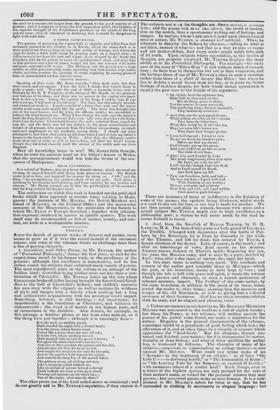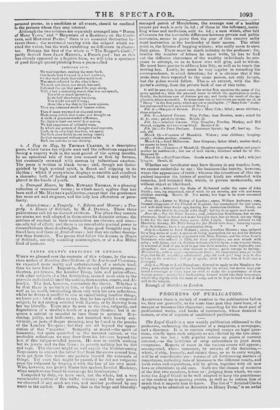POETRY.
Amin the dearth of general works of interest and matter, verse seems to grow as if it were the vernal instead of the autumnal season; and some of the volumes before us challenge more than a line of passing chronicle.
I. Genddine, with Other Poems, by Mr. TUPPER, the author of" Proverbial Philosophy," claims the first place, as well for the expectations raised by his former work, as the excellence of the present ; although this excellence is comparative, and he has rather varied his subjects than exhibited much variety of powers. The most considerable piece in the volume is an attempt of the boldest kind; Geraldine being neither more nor less than a con- tinuation of Chrisiebe/. Mr. TUPPhlt takes up the tale where COLERIDGE broke off, (after having brought the forest found Geral- dine to the hull of Cluistabers father); and skilfully connects his own story with the original, as well as imitates its wildness of Elsie and images with a felicity which nothing but a long and enthusiastic acquaintance with his prototype would impart. Something, however, is still wanting, — not consistency, for improbability is the foundation of Christabel, and wildness its characteristic ; the want is of matter in the human parts, and
of earnestness in the diablerie. One detects, for example, in this passage, a familiar phrase or two from other authors, as if the thing were put together ; although it is cunningly chinc-
h is the wolf, on stealthy prowl,
Bath startled the night with a dismal howl; It is the raven, whose hoarse croak Comes like a groan from the sear old oak ; It is the owl, whose curdling scremli Hath peopled with terrors the spectral beech; Fur again the clock bath toll'd out twelve,
And sent to their gambols the gnome and the eke,
And awoken the friar his beads to tell, And taught the magician the time for his spell, And to her cuuldon bath hurried the witch, And arous'd the deep bay of the mastiff bitch.
The gibbous moon, all chilling and wan, Like a sleepless eyeball looketh on; Like an eyeball of sorrow behind a shroud Forth looketh she ftom a torn gray cloud,
Pouring sad radiance on the black air,—
Sun of the night, what sees she there?
The other pieces are of the kind called minor or occasional; and du not greatly add to Mr. Tuenstes reputation, if they sustain it.
The subjects and e an the thoughts are Alen c nnuion, em esrhaps trite ; and the poems look more like ellinqs, the result of medita- tion on the search, than a spontaneous wellingsout of feelings and images. In matters whose tiuth must depend upon observation of man or nature, Mr. TUPPER is abstract and artificial. Thus, he attempts to describe the Sahara by absences;—telling us what is not there, instead of what is; and that its a war at once so vague and yet matter-of-fact, that every reader might safely take oath of its truth. Upon subjects where speculation, or the results of thought, are properly exercised, Mr. TUPPER displays the same ability as in his Proverbial Philosophy. For example —this early part of the story of "Ellen Gray " is told without much of consist- ency ; its facts true in themselves but not its their connexion, and the feelings those of one of Mr. TUPPER'S class in such a situation rather than those of a child of misery like Ellen : but when he has to deduce a moral lesson from her fate, or to paint the bates% feelings of reckless despair, (to both which things speculation is equal,) the poet rises to the height of his argumeut.
" Alt, lightly heed the righteous few, How little to themselves is due, But all things given to them ; Vet the unwise, because untaught, The wandering sheep, because unsought, They heartlessly condemn : " And little can the untempted dream, While gliding smoothly on life's stream They keep the letter-laws, What they would be, if, tost like me, Hopeless upon life's barren sea, They knew how hunger gnaws.
" I was half.starved ; I tried in vain To get me work my bead to gain ; Before me Hew my shame; Cold Charity put up her purse, And none look'd on Inc but to curse The child of evil fame.
" Alas! why need I count by links The heavy leagthening chain that sinks My heart, my soul, my all ? I still was fair though hope was dead, And so I sold myself for bread, And lived upon my fall.
" Now was I reckless, bold, and bad—
My love was hate-1 grew half mad With thinking on my wrongs; Disease, and pain, and giant.sin
Rent licitly and soul, and raged within.
Such meed to guilt belongs."
There are instances of haste or indifference in the finishing of some of the poems ; the epithets being ill-chosen, whilst words ale used to eke out the line, or one line is made for another. We are thus minute and plain in remark, because with pains and a genial subject Mr. TUPPER might rise to high excellence as a philosophic poet; a station he will never reach by the road he seems inclined to travel.
2. Axel, from the Swedish of ESAIAS TEGNER, by G. R. LATH sal, M.A. The hero of this poem is a body guard of CHARLES the Twelfth. Charged with despatches after the battle of Pul- towa by his Sovereign, he is beset by Cossacks in the wilds of the Ukraine, and left for dead ; but restored by Theela, a female chieftain of the desert. Love, of course, is the result ; and after an interchange of vows, Axel speeds on his mission. Absence causes distrust in Thecla's mind: disguising her sex, she joins the Russian army, and is slain by a party, headed by Axel; who, after a due space of sorrow, dies upon her tomb.
In this story there is nothing very novel. The incidents and scenery of the earlier part resemble those in Mazeppa—which the poet, or his translator, seems to have kept in view ; and though the tale is told with grace and spirit, it wants the interest which passion and character, or even a correct portraiture of national manners, impart. The Frithiqf of the same author, by the same translator, in addition to the merit of its verse, trans- ported the reader to other times; showing hitn the manners and usages of the old Northmen, as well as giving him a reflected specimen of their literature. Axel has no other recommendation than its story, and its elegant and pleasing verse.
3. Unless our memory much deceives us, Mr. RICHARD AIONKTON MILNES was announced to the world as a sort of eighth weeder; but these his Poems, in two volumes, will neither sustain the praises of his partial critic friend, nor make a reputation for the author. Elegance is the general characteristic of the volumes, sometimes varied by a peculiarity of good feeling which looks the affectation of it, and at other times by a vivacity of manner which approaches the "dead-lively." But his elegance, though sus- tained and finished, soon wearies; for it is unsupported by matter, thought, or deep feeling: and what of these qualities the author has, is weakened by diffusion. The character of many of his subjects—occasional, or commonplace as college themes—is also against Mr. Ms Less. What could any writer make of an " Acrostic—in the beginning of an album ; " or of lines "On Lady C-- in declining health," or "The Imsnortality of Rome ; " or "Ott Leaving Italy for the Summer, on account of health ; " with numerous others of a similar kind ? Such things, even in a writer of the highest genius, are only perused for the sake of their author's name, or valued for the personal interest they may possess ; but occasional poems make no man famous. It is a com- pliment to Mr. Mu.Nes's talent for verse to say, that he has succeeded in clothing fit sentiments in elegant language : but
personal poems, in a candidate at all events, should be confined to the persons whom they may interest.
Although the two volumes are separately arranged into" Poems of Many Years," and " Memorials of a Residence on the Conti- nent, and Historical Puems," there i3 no essential distinction be- eween them ; the sentiment varying with the subject which ex- cited the writer, but the work exhibiting no difference in charac- ter. Perhaps the best of the whole is " The Beggar's Castle," partly derived from JEAN REBOUL, a French poet: but as this has already appeared in a fugitive form, we will take u specimen of good though quaint painting from a poem called FAMILIAR Love.
We read together, reading the same hook, Our heads bent forward in a half embrace, So that each shade that either spirit took Was strait reflected in the other's face: We read, not ejlnt, nar alcud, but each Followed the rye that passed the page along, With a low murmuring sound, that was not speech, Yet with so much monotony, In its half slumbering harmony, You might not al it song; More like a bee that in the noon rejoices, Than any customed mood of human voice.
Then if some wayward or disputed sense Made cease awhile that music. and brought on A strife of gracious.worded difference, Toa light to hurt oar souls' dear unison, We had expel ienee of a blissful state, In which our powers of thought stood separate, Each, in its own high freedom, set apatt,
But both close folded in one loving heart ;
So that we seemed without conceit to be Both one and two in our identity.
4. A Day in May, by Thomas CLARKE, is a descriptive poem, which ye/kg the objects seen and the reflections suggested during a country walk in the most genial of the spring months, by an episodical tale of true love crossed at first by fortune, but eventually crowned with success by industrious exertion. The poem is written in blank verse; and, though not dietin- guished by high poetical spirit, is fluent and tripping in its rhythm ; whilst it everywhere displays so amiable and excellent a character both of feeling and morality, that it may safely be placed in the hands of youth.
5. Tranquil Hours, by Mrs. EDWARD THOMAS, is a pleasing collection of occasional verses; to which much applies that has been said of Mr. MILNES'S publication, except that the gentleman has more art and elegance, and the lady less affectation or pecu- liarity.
6. Aristodemus ; a Tragedy. 7. Edwin and Morear ; a Tra- gedy. 8. Hours of Solitude, by H. J. DANIEL. These three publications call for no distinct crilitism. The plays they contain are stories not well adapted in themselves for dramatic action; the artifices of conduct in their construction are obvious, and conse- quently fail of effect; and there is no remarkable poetical power to counterbalance these deadweights. Some good thoughts may be found here and there in Aristodemus ; but they are rather descrip- tive than dramatic. The poems that follow the dramas in Hours of Solitude, are only seunding commonplace, or of a Joe Miller kind of humour.



























 Previous page
Previous page